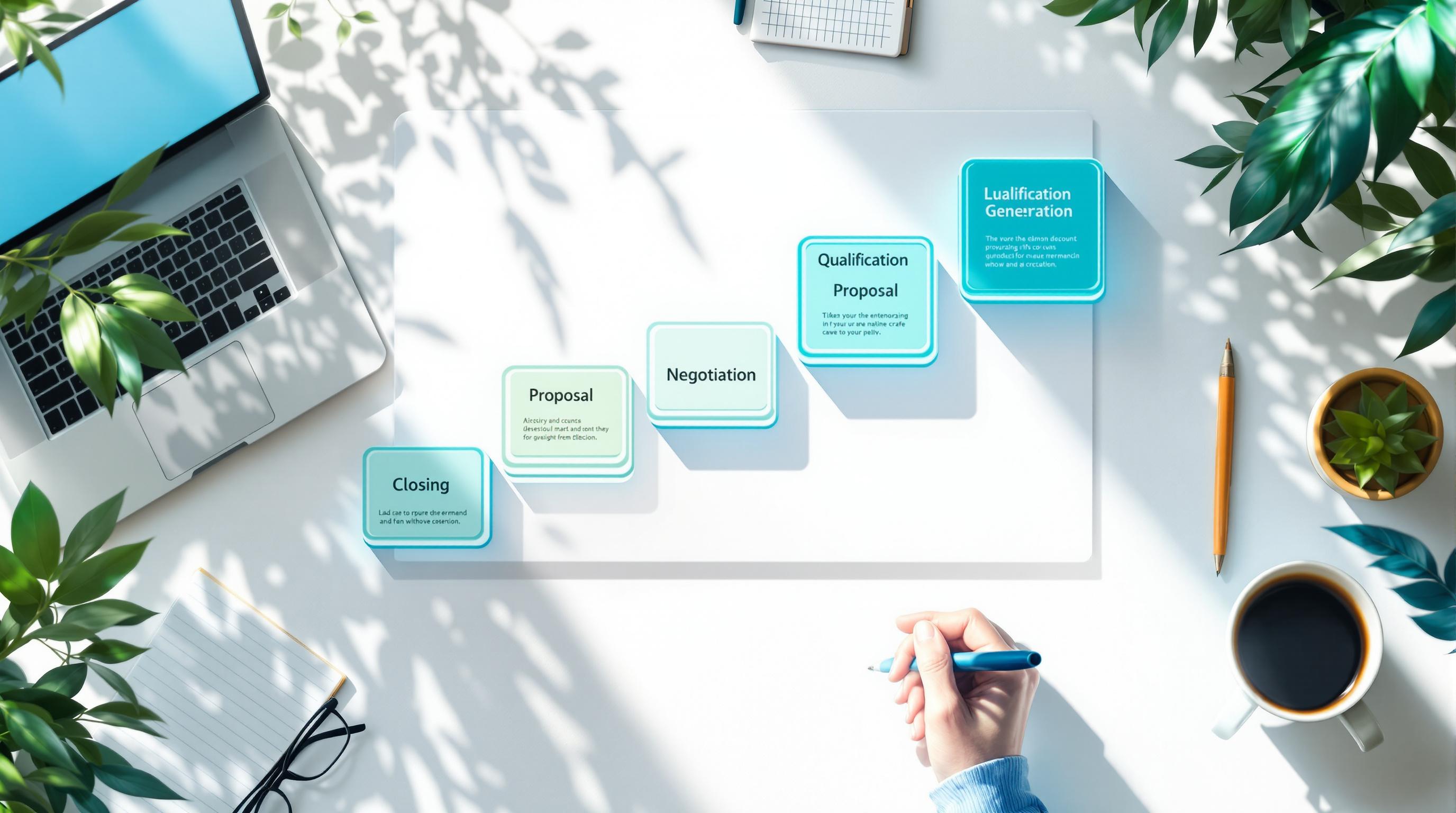Trust funnels focus on building trust and long-term customer relationships rather than just making quick sales. They work by addressing human psychology and creating credibility through consistent value, social proof, and emotional connections. Here’s what you need to know:
- Why Trust Matters: Over 90% of people trust recommendations from friends and family, and trust impacts metrics like customer loyalty and conversion rates.
- Key Psychological Principles:
- Reciprocity: Offer free tools or resources upfront to build trust.
- Consistency: Regular, reliable interactions strengthen confidence.
- Social Proof: Use testimonials, reviews, and endorsements to reassure customers.
- How Trust Funnels Differ from Traditional Funnels:
- Focus on relationships, not just sales.
- Provide helpful, customer-focused content.
- Measure success through satisfaction and loyalty, not just short-term results.
Quick Comparison
| Aspect | Traditional Funnel | Trust Funnel |
|---|---|---|
| Primary Focus | Quick conversions | Building relationships |
| Content Strategy | Promotional | Informative and helpful |
| Success Metrics | Sales numbers | Satisfaction and loyalty |
| Timeline | Short-term results | Gradual trust-building |
Examples: Companies like Amazon, LinkedIn, and Airbnb excel by using verified reviews, educational content, and emotional connections to build trust. Avoid pitfalls like inconsistent communication or over-promising, which erode trust.
Start by offering value upfront, personalizing content, and guiding customers through small, low-risk steps to build lasting relationships.
Building Sustainable Relationships That Bring Brands and People Closer
Psychology Behind Trust Funnels
Trust funnels are built on core principles of human behavior that influence how people make decisions and connect with brands. By understanding these psychological concepts, businesses can craft marketing strategies that naturally establish credibility and nurture long-term customer relationships.
Offering Value First
The principle of reciprocity suggests that when businesses provide something valuable upfront - like free tools or educational resources - customers are more likely to respond with loyalty and engagement. Offering free content or resources without demanding immediate payment not only demonstrates expertise but also lowers initial skepticism. This approach builds credibility by delivering real value before asking for anything in return.
The Power of Consistency
Trust develops through reliable and predictable interactions over time. Whether it’s regular content updates, prompt responses, or maintaining quality across all touchpoints, consistency reassures customers and strengthens their confidence in your brand. Examples include structured email schedules, quick customer service replies, or ensuring the same high standards in every interaction. Once reliability is established, trust funnels can amplify it with external validation, such as social proof.
Leveraging Social Proof and Authority
People naturally look to others for validation, and trust funnels use this instinct to their advantage. Authority signals - like expert endorsements or certifications - are strategically placed at key decision points to reinforce trust. For instance, healthcare products gain credibility through endorsements from medical professionals, while educational tools might highlight testimonials from teachers.
The best trust funnels combine these psychological elements - reciprocity, consistency, and social proof - in a way that feels genuine and relatable. By integrating these principles into your approach, you can guide customers from initial skepticism to loyalty, forming strong, lasting connections based on meaningful value.
Steps to Create Trust Funnels
Tailoring Content to Customers
Personalization plays a major role in building trust in marketing. Research from McKinsey shows that personalized interactions can increase sales by 10-30% and improve customer satisfaction by 20-30%. But personalization isn't just about using someone's name - it's about aligning content with their behavior and preferences.
To do this effectively, start by segmenting your audience based on factors like their interactions, purchase history, or stated interests. For example, HubSpot customizes content recommendations based on a user's industry and role. This means marketing managers and sales directors receive content that's relevant to their specific needs.
Once you've personalized the content, focus on delivering meaningful value early in their journey.
Offering Value Upfront
Building trust often begins with giving value right away. This taps into the psychological principle of reciprocity, where people are more likely to trust and engage with you after receiving something useful. This is especially impactful in B2B settings, where decisions often carry higher stakes.
| Type of Value Provided | Purpose | Example Use |
|---|---|---|
| Educational Resources & Tools | Showcase expertise and provide practical help | Templates, industry reports, auditing tools |
| Free Trials | Offer a no-risk way to explore your product | 14-day full-feature trial access |
Providing value early on lays the groundwork for trust, but it’s important to nurture that trust over time.
Building Trust Gradually
Trust isn't built overnight - it grows through small, low-risk steps that make customers feel comfortable. This approach aligns with the principle of consistency, where each positive interaction builds confidence for the next.
Start with simple, low-commitment actions like signing up for a newsletter or downloading a whitepaper. These small steps, or micro-conversions, help establish trust. Salesforce exemplifies this by guiding users through gradual feature adoption, where each success leads to deeper engagement with their platform.
Keep an eye on engagement metrics to spot areas where customers might need extra support or reassurance. Use social proof effectively at key moments - like showing testimonials or case studies that reflect the challenges and industries of your audience.
For businesses looking to refine their trust funnels, the Marketing Funnels Directory offers focused resources, including tools for tracking micro-conversions and applying progressive engagement techniques. This can help you build a system that strengthens trust at every stage.
sbb-itb-a84ebc4
Examples and Lessons from Trust Funnels
Here’s a closer look at how some companies are excelling in trust funnels - and what lessons can be learned from their strategies.
What Successful Companies Do Right
Top-performing companies often follow clear patterns when building trust funnels. For example, Amazon uses verified reviews to significantly boost product conversions - by 28% compared to unverified listings. LinkedIn relies on educational content to build trust, driving a 57% growth in premium subscriptions. Similarly, Airbnb has seen a 35% increase in host applications through its Host Stories program, which highlights personal, relatable experiences.
| Trust-Building Element | Company Example | Impact |
|---|---|---|
| Verified Social Proof | Amazon's "Verified Purchase" | 28% higher conversion rate |
| Educational Content | LinkedIn Learning | 57% YoY premium subscription growth |
| Emotional Connection | Airbnb's Host Stories | 35% increase in host applications |
Mistakes to Avoid in Trust Funnels
Even with good intentions, some common errors can undermine trust funnels. According to HubSpot's research, three major pitfalls often lead to trust issues:
- Offering too many rewards upfront can attract low-quality leads, leading to a 40% higher churn rate within three months.
- Inconsistent communication can erode trust, with studies showing a 25% drop in confidence when engagement becomes irregular.
- Overstating expertise or making unsupported claims can have severe consequences, with 73% of customers disengaging immediately when trust is broken.
Companies like Salesforce avoid these missteps by focusing on genuine engagement and gradually building trust. Their approach - targeted solutions and consistent communication - has resulted in an impressive 94% customer retention rate.
Conclusion and Resources
Key Points Recap
Building trust in marketing funnels hinges on creating emotional connections, delivering consistent value, and genuine engagement. Did you know over 90% of customers trust word-of-mouth recommendations? This makes social proof a critical part of earning trust. Research shows that successful trust funnels blend these elements to build long-term customer relationships.
Big names like Amazon, LinkedIn, and Salesforce demonstrate this in action. Amazon uses verified reviews, LinkedIn invests in educational content, and Salesforce thrives on consistent engagement. These examples highlight how trust-focused approaches can boost customer loyalty, increase conversions, and improve overall interaction.
If you're ready to apply these principles, there are plenty of tools and strategies available to help you get started.
Discover the Marketing Funnels Directory

The Marketing Funnels Directory provides a collection of tools and resources designed to fine-tune your trust-building efforts. It includes:
- Strategies for meaningful social media engagement
- Frameworks for effective content marketing
- Tips for strengthening B2B relationships
- Techniques for improving funnel performance
This platform also helps businesses steer clear of common mistakes, like the 40% higher churn rates caused by over-incentivizing or the 25% confidence dip from inconsistent communication. Check out Marketing Funnels Directory to explore these resources and take your trust-building strategies to the next level.
FAQs
What is a trust signal?
Trust signals are elements on websites or at physical sales points designed to reassure customers and boost their confidence in making a purchase. These can include things like customer reviews, SSL badges, and certifications. For example, SSL badges can improve checkout completion rates by 42%, and testimonials tap into the fact that 90% of people trust word-of-mouth recommendations.
| Trust Signal Type | Examples | Effect on Trust |
|---|---|---|
| Social Proof | Customer reviews, testimonials | 90% trust rate for word-of-mouth recommendations |
| Security | SSL certificates, payment badges | Increases checkout completion by 42% |
| Credibility Signals | Industry certifications, expert endorsements | Builds trust in specialized fields |
The effectiveness of trust signals depends on where they are placed. For instance, displaying security badges during the checkout process directly addresses safety concerns, while showcasing industry certifications on the homepage helps establish credibility right away.
For businesses looking to improve trust across different customer touchpoints, the Marketing Funnels Directory provides tools and advice tailored to building confidence, whether through social media or B2B strategies.


